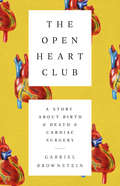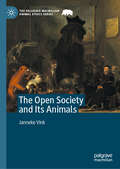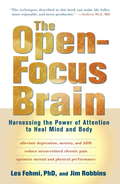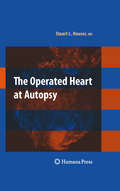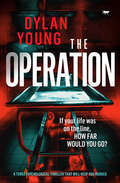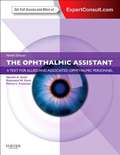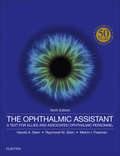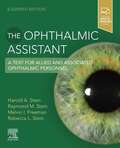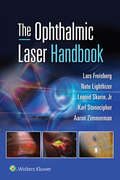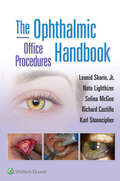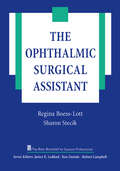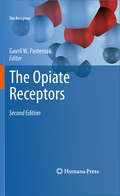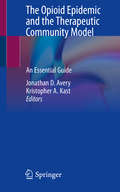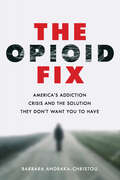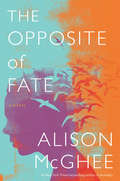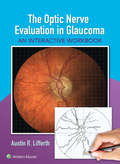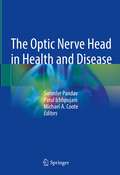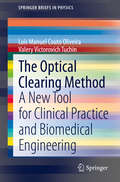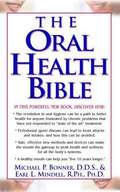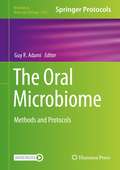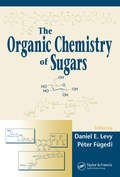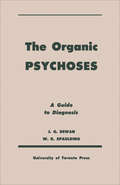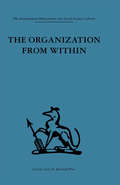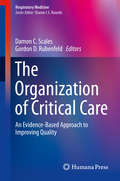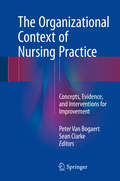- Table View
- List View
The Open Heart Club: A Story about Birth and Death and Cardiac Surgery
by Gabriel BrownsteinThis absorbing and poignant book is not merely the story of one writer's flawed heart. It is a history of cardiac medicine, a candid personal journey, and a profound reflection on mortality.Born in 1966 with a congenital heart defect known as the tetralogy of Fallot, Gabriel Brownstein entered the world just as doctors were learning to operate on conditions like his. He received a life-saving surgery at five years old, and since then has ridden wave after wave of medical innovation, a series of interventions that have kept his heart beating.The Open Heart Club is both a memoir of a life on the edge of medicine's reach and a history of the remarkable people who have made such a life possible. It begins with the visionary anatomists of the seventeenth century, tells the stories of the doctors (all women) who invented pediatric cardiology, and includes the lives of patients and physicians struggling to understand the complexities of the human heart. The Open Heart Club is a riveting work of compassionate storytelling, a journey into the dark hinterlands between sickness and health lit by bright moments of humor and inspiration.
The Open Society and Its Animals (The Palgrave Macmillan Animal Ethics Series)
by Janneke VinkThis book is an interdisciplinary study centred on the political and legal position of animals in liberal democracies. With due concern for both animals and the sustainability of liberal democracies, The Open Society and Its Animals seeks to redefine animals’ political-legal position in the most successful political model of our time. Advancements in modern science point out that many animals are sentient and that, like humans, they have certain elementary interests. The revised perception of animals as beings with elementary interests raises questions concerning the liberal democratic institutional framework: does a liberal democracy have a responsibility towards the animals on its territory, and if so, what kind? Do animals need legal animal rights and lawyers to represent them in court, and should they also be represented in parliament? And how much change of this kind could a liberal democracy really endure? Vink addresses these and other pressing questions relating to the political and legal position of animals in this persuasive and authoritative work, compelling us to reconsider the relationship between the open society and the animals in it.
The Open-Focus Brain: Harnessing the Power of Attention to Heal Mind and Body (Personal Development Ser.)
by Jim Robbins Les FehmiThis breakthrough book presents a disarmingly simple idea: The way we pay attention in daily life can play a critical role in our health and well-being. According to Dr. Les Fehmi, a clinical psychologist and researcher, many of us have become stuck in "narrow-focus attention": a tense, constricted, survival mode of attention that holds us in a state of chronic stress--and which lies at the root of common ailments including anxiety, depression, ADD, stress-related migraines, and more. To improve these conditions, Dr. Fehmi explains that we must learn to return to a relaxed, diffuse, and creative form of attention, which he calls "Open Focus."This highly readable and empowering book offers straightforward explanations and simple exercises on how to shift into a more calm, open style of attention that reduces stress, improves health, and enhances performance. The Open-Focus Brain features eight essential attention exercises for improving health, along with an audio CD in which the author guides the reader through fundamental Open-Focus exercises that can be used on a regular basis to enhance our health and well-being.Dr. Fehmi writes, "Everyone has the ability to heal their nervous systems, to dissolve their pain, to slow down and yet accomplish more, to experience the deeper side of life--in short, to change their lives for the better dramatically." At last readers can learn the techniques that Dr. Fehmi has offered to thousands of clients--the same drug-free, safe, and effective techniques that have led to remarkable and long-lasting results.The Open-Focus Brain offers readers a revolutionary, drug-free way to: * alleviate depression, anxiety, and ADD * reduce stress-related chronic pain * optimize mental and physical performanceThe eBook includes an audio program that provides further guidance on: * essential attention exercises from the book, led by Dr. Fehmi * how to "train the brain" to reduce stress, anxiety, chronic pain, and more * safe and effective techniques used in Dr. Fehmi's clinic for decades
The Operated Heart at Autopsy
by Stuart Lair HouserThe Operated Heart at Autopsy addresses the need of pathologists in practice and, especially, in training to achieve a new level of competence in dealing, at the time of autopsy, with the anatomic complexity of a heart that has undergone previous surgical treatment, whether that treatment occurred in the recent or remote past. Ready identification of post-operative morphologic changes in the heart will greatly increase the comfort level of the pathologist as he takes on the challenge of the operated heart. By drawing on lessons learned as a cardiac surgeon, the author offers reasonable guidelines to the pathologist facing this challenging task. Such guidelines include a methodical approach to assess multiple operative procedures on the heart. Previous surgery may include construction of coronary artery bypass grafts (CABG), replacement or repair of one or more heart valves, repair of one or more congenital heart anomalies, or some other procedure. Questions will arise at such an autopsy.
The Operation: A Tense Psychological Thriller that Will Keep You Hooked
by Dylan YoungA nurse’s abduction goes viral—and a surgeon’s life spirals—in a suspenseful tale by the author of The Appointment.Surgeon Jacob Thorn isn’t worried when the police interview him over nurse Katy Leith’s disappearance. She is a co-worker, nothing more. But when a leaked video of an argument between him and the missing woman goes viral, the social media reaction is vicious.When harrowing images of the kidnapped woman start to appear on his phone, along with a demand from her abductor that Jake confess to a crime he has no recollection of committing, he is forced to act or face terrifying consequences. He needs to delve into the past for answers. But time is running out for Katy. Will he admit to his failings and lose everything, or plead ignorance and let an innocent girl die?
The Ophthalmic Assistant: A Text for Allied and Associated Ophthalmic Personnel
by Harold A. Stein Raymond M. Stein Melvin I. FreemanExcel in your clinical responsibilities with The Ophthalmic Assistant. Whether you work in an ophthalmology, optometry, or opticianry setting, this best-selling reference delivers expert practical, up-to-date guidance on ocular diseases, surgical procedures, medications, and equipment as well as paramedical procedures and office management - providing all the knowledge and skills you need to be a valuable asset to your team. A real "how-to" textbook. Practical guidance to help you tackle the ophthalmic challenges and cases you face everyday
The Ophthalmic Assistant: A Text for Allied and Associated Ophthalmic Personnel
by Harold A. Stein Raymond M. Stein Melvin I. FreemanNow in its tenth edition, the best-selling The Ophthalmic Assistant, by Drs. Harold A. Stein, Raymond M. Stein, and Melvin I. Freeman, is your go-to resource for practical, up-to-date guidance on ocular diseases, surgical procedures, medications, and equipment, as well as paramedical procedures and office management in the ophthalmology, optometry, opticianry or eye care settings. Thoroughly updated content and more than 1,000 full-color illustrations cover all the knowledge and skills you need for your day-to-day duties as well as success on certification and recertification exams. This comprehensive text provides essential learning and practical guidance for ophthalmic assistants, technicians, medical technologists, physician assistants, and all others involved in ocular care, helping each become a valuable asset to the eye care team.
The Ophthalmic Assistant: A Text for Allied and Associated Ophthalmic Personnel
by Harold A. Stein Raymond M. Stein Melvin I. Freeman Rebecca SteinCovering all the knowledge and skills needed for everyday duties as well as success on certification and recertification exams, The Ophthalmic Assistant, 11th Edition, is an essential resource for allied health personnel working in ophthalmology, optometry, opticianry, and other eye care settings. Drs. Harold A. Stein, Raymond M. Stein, and Melvin I. Freeman are joined by new editor Dr. Rebecca Stein and several new contributing authors who provide practical, up-to-date guidance on ocular diseases, surgical procedures, medications, and equipment, as well as paramedical procedures and office management for today’s practice. This outstanding reference and review tool provides essential knowledge and guidance for ophthalmic assistants, technicians, and technologists as critical members of the eye care team.
The Ophthalmic Laser Handbook
by Nathan LighthizerAs new laser technology continues to emerge in the eye care field, there is a need for an up-to-date, comprehensive resource for eye care providers who are learning or currently performing these laser procedures. Edited by Lars Freisberg, Nate Lighthizer, Leonid Skorin, Jr., Karl Stonecipher, and Aaron Zimmerman, The Ophthalmic Laser Handbook is a practical, clinical guide that covers everything from indications and procedural techniques to contraindications and potential adverse events. This all-in-one reference, including over 45 videos of laser procedures in the e-version, is designed for all eye care providers—from those performing the procedures to those co-managing pre- and post-operative visits.
The Ophthalmic Office Procedures Handbook
by Leonid Skorin Nathan R Lighthizer Richard Castillo Selina McGee Karl StonecipherOffering practical guidance to those who are learning or already performing office-based ophthalmic procedures, The Ophthalmic Office Procedures Handbook reviews all current procedural and surgical techniques routinely performed in an office or minor-surgery suite. Written by Leonid Skorin, Nate Lighthizer, Selina McGee, Richard Castillo, and Karl Stonecipher, this unique handbook is an excellent resource for all eye care providers—both those performing the procedures as well as those who are co-managing pre- and post-operative visits.
The Ophthalmic Surgical Assistant (The Basic Bookshelf for Eyecare Professionals)
by Regina Boess-Lott Sharon StecikThe Basic Bookshelf for Eyecare Professionals is a series that provides fundamental and advanced material with a clinical approach to clinicians and students. A special effort was made to include information needed for the certification exams in ophthalmic and optometric assisting, as well as for surgical assistants, opticians, plus low vision, and contact lens examiners.This book contains basic guidelines and typical scenarios that the ophthalmic surgical assistant needs to know. The text begins with the operative patient, including preoperative testing and consents, and travels through the operating room experience. Topics include gowning and gloving, preparing trays and tables, and sterilization techniques. Detailed descriptions of common operative procedures such as plastics, cataract, corneal, and retinal procedures are also included. Operative notes are written on a minute-by-minute basis so the reader can become familiar with the instruments and other implements, and the order in which they are used. This text will help prepare the ophthalmic assistant for any setting, whether it be hospital or office based.
The Opiate Receptors
by Gavril W. PasternakThis new edition covers the latest knowledge on opiate receptors and related receptor subtypes. It discusses many topics pertaining to the unique integrated approach of correlating the biochemical, physiological and pharmacological aspects of opiate reaction.
The Opioid Epidemic and the Therapeutic Community Model: An Essential Guide
by Jonathan D. Avery Kristopher A. KastThis book aims to explore the evidence supporting the therapeutic community (TC) modality as a uniquely effective approach to care of individuals living with opioid use disorder and other addictions, and also to identify salient mediators of improved outcome, including long-term treatment and removal from the opioid-associated environment. The book includes multiple international perspectives and is designed for worldwide appeal—for countries that have established some TCs with success, those looking to improve care, and those looking to build them for the first time. Written by experts in addiction psychiatry and medicine, this book describes the unique role of therapeutic communities in treating substance use disorders, how the model has changed over time and adapted to diverse sociocultural contexts and systems of care, and how the TC model may serve an important population in the context of the current opioid epidemic. The chapters are written so as to be accessible for clinicians across specialties and professions. The Opioid Epidemic and the Therapeutic Community Model is an excellent resource for all professionals interested in diverse and effective models of care to treat opioid use disorder and other addictions, including addiction medicine specialists, psychiatrists, psychologists, rehabilitation administrators, hospitalists, social workers, public health workers, students, and the interested public
The Opioid Fix: America's Addiction Crisis and the Solution They Don't Want You to Have
by Barbara Andraka-ChristouWhy medication-assisted treatment, the most effective tool for battling opioid addiction, is significantly underused in the United States.Bronze Winner of the 2021 IPPY Book Award in Health/Medicine/Nutrition, Gold Winner of the 2020 Foreword INDIES Award in HealthAmerica's addiction crisis is growing worse. More than 115 Americans die daily from opioid overdoses, with half a million deaths expected in the next decade. Time and again, scientific studies show that medications like Suboxone and methadone are the most reliable and effective treatment, yet more than 60 percent of US addiction treatment centers fail to provide access to them. In The Opioid Fix, Barbara Andraka-Christou highlights both the promise and the underuse of medication-assisted treatment (MAT). Addiction, Andraka-Christou writes, is a chronic medical condition. Why treat it, then, outside of mainstream medicine? Drawing on more than 100 in-depth interviews with people in recovery, their family members, treatment providers, and policy makers, Andraka-Christou reveals a troubling landscape characterized by underregulated treatment centers and unnecessary ideological battles between twelve-step support groups and medication providers. The resistance to MAT—from physicians who won't prescribe it, to drug courts that prohibit it, to politicians who overregulate it—showcases the narrow-mindedness of the system and why it isn't working. Recounting the true stories of people in recovery, this groundbreaking book argues that MAT needs to be available to anyone suffering from opioid addiction. Unlike other books about the opioid crisis, which have largely focused on causal factors like pharmaceutical overprescription and heroin trafficking, this book focuses on people who have already developed an opioid addiction but are struggling to find effective treatment. Validating the experience of hundreds of thousands of Americans, The Opioid Fix sounds a loud call for policy reforms that will help put lifesaving drugs into the hands of those who need them the most.
The Opposite of Fate: A Novel
by Alison McGheeA young woman emerges from a lengthy coma to face the decisions made about her body—without her consent—in this powerful novel of reclamation and hope.Twenty-one-year-old Mallie Williams—scrappy, headstrong, and wise beyond her years—has just landed on her feet following a tumultuous youth when the unthinkable happens: she is violently assaulted. The crime leaves her comatose, surrounded by friends and family who are hoping against hopes for a full recovery.But soon Mallie’s small community finds themselves divided. The rape has left Mallie pregnant, and while some friends are convinced that she would never keep the pregnancy, others are sure that a baby would be the only good thing to come out of all of this pain. Who gets to decide? How much power, in the end, do we have over our own bodies? Mallie, her family, and her town find themselves at the center of a media storm, confronting questions nobody should have to face. And when Mallie emerges from the fog, what will she think of the choices that were made on her behalf?The Opposite of Fate is an intense and moving exploration of the decisions we make—and don’t make—that forever change the course of our lives.
The Optic Nerve Evaluation in Glaucoma: An Interactive Workbook
by Austin LifferthAll eye care providers should be proficient in evaluating the optic nerve for glaucoma in their patients. The Optic Nerve Evaluation in Glaucoma: An Interactive Workbook, gives you the practice you need to make sure your abilities are up to speed. This practical primer takes you from learning to applying – by creating a visually rich, interactive experience.
The Optic Nerve Head in Health and Disease
by Parul Ichhpujani Surinder Pandav Michael A. CooteThe book provides a detailed description in color format of the optic nerve head changes that occur in glaucoma. It explains the normal and variant anatomy of an optic nerve head and why certain discs are more or less likely to develop glaucomatous changes.This book attempts to explain the anatomical basis of common and not so common signs seen in optic nerve head and retinal nerve fibre layer as captured by a digital fundus imaging system and optical coherence tomography. It also includes optic nerve head conditions mimicking glaucoma. The book is relevant for practicing ophthalmologists, vision science researchers, clinical optometrists, postgraduate residents in ophthalmology, sub-specialty fellows as well as general ophthalmologists, neurologists and neurosurgeons.
The Optical Clearing Method: A New Tool for Clinical Practice and Biomedical Engineering (SpringerBriefs in Physics)
by Luís Manuel Oliveira Valery Victorovich TuchinThis book describes the Optical Immersion Clearing method and its application to acquire information with importance for clinical practice and various fields of biomedical engineering. The method has proved to be a reliable means of increasing tissue transparency, allowing the investigator or surgeon to reach deeper tissue layers for improved imaging and laser surgery. This result is obtained by partial replacement of tissue water with an active optical clearing agent (OCA) that has a higher refractive index and is a better match for the refractive index of other tissue components. Natural tissue scattering is thereby reduced. An exponential increase in research using this method has occurred in recent years, and new applications have emerged, both in clinical practice and in some areas of biomedical engineering. Recent research has revealed that treating ex vivo tissues with solutions containing active OCAs in different concentrations produces experimental data to characterize drug delivery or to discriminate between normal and pathological tissues. The obtained drug diffusion properties are of interest for the pharmaceutical and organ preservation industry. Similar data can be estimated with particular interest for food preservation. The free water content evaluation is also of great interest since it facilitates the characterization of tissues to discriminate pathologies. An interesting new application that is presented in the book regards the creation of two optical windows in the ultraviolet spectral range through the application of the immersion method. These induced transparency windows open the possibility to diagnose and treat pathologies with ultraviolet light. This book presents photographs from the tissues we have studied and figures that represent the experimental setups used. Graphs and tables are also included to show the numerical results obtained in the sequential calculations performed.
The Oral Health Bible
by Michael P. Bonner DDS Earl L. Mindell RphAnother health revolution has arrived, says Dr. Michael Bonner in his well-researched new book The Oral Health Bible, and there is no longer any separation between mouth medicine and body medicine. The mouth is completely connected to the body, he says, and is a doorway to achieving peak health and wellness in all the body's systems. This informative book contains an action plan for taking charge of our oral health and it educates us and our physicians and dentists by detailing how many debilitating health problems-conditions such as arteriosclerosis, heart attacks, strokes, rheumatoid arthritis, and premature and low-birth-weight babies-are intimately linked to oral health and hygiene. . Dr. Bonner emphasizes the importance of finding and treating periodontal (gum) disease because, untreated, it can lead to heart attacks and strokes. He sees more gum disease now than he did twenty-five years ago, he says, largely because of the increasing availability of harmful oral hygiene products on the market. Mouthwashes, for example, are generally considered trustworthy, but in reality, they are the cause of 36,000 cases of oral cancer a year. Moreover, 500 people are killed annually from alcohol ingestion related to mouthwashes. Dr. Bonner discusses safe, effective oral health techniques and products in order to reverse gum disease with its far-reaching negative consequences. He also outlines how nutritional supplements can help deliver potentially enormous benefits to oral, as well as overall, health. In 1910, the Mayo (clinic) brothers said, "A person with a healthy mouth will live ten years longer. "
The Oral Microbiome: Methods and Protocols (Methods in Molecular Biology #2327)
by Guy R. AdamiThis volume discusses the oral microbiome, and oral and systemic health. The chapters in this book cover topics such as analytical techniques for identifying and measuring oral bacteria; strategies for controlling common sources of variability in oral microbiome methods for viral bacterial and fungal analysis; ways to study oral DNA and RNA samples to identify molecular pathways to disease; approaches to functional assays for oral bacteriophage, antibiotic purging of systemic bacteria; and metaproteomic analysis of various oral samples. Written in the highly successful Methods in Molecular Biology series format, chapters include introductions to their respective topics, lists of the necessary materials and reagents, step-by-step, readily reproducible laboratory protocols, and tips on troubleshooting and avoiding known pitfalls. Cutting-edge and practical, The Oral Microbiome: Methods and Protocols is a valuable resource for any scientist or researcher looking to further study this exciting and developing field.
The Organic Chemistry of Sugars
by Daniel E. Levy Péter FügediIntrigued as much by its complex nature as by its outsider status in traditional organic chemistry, the editors of The Organic Chemistry of Sugars compile a groundbreaking resource in carbohydrate chemistry that illustrates the ease at which sugars can be manipulated in a variety of organic reactions. Each chapter contains numerous examples demonst
The Organic Psychoses: A Guide to Diagnosis
by John Dewan William SpauldingPsychoses due to physical disturbances involving the brain are common and can complicate a bewildering variety of illnesses. Patients with such disorders may be encountered in general practice, emergency wards, medical services, on the surgical ward, post-operatively as well as in psychiatric clinics and of course in mental hospitals. A specialist in psychiatry and a specialist in internal medicine have collaborated to fill an important gap in medical literature of practical value to the physician. Throughout the book the needs of doctors who are responsible for such patients has been kept in mind. In this well-organized, concise monograph the organic psychoses are classified in a comprehensive manner which can be easily applied to clinical cases. The chief diagnostic features of the various organic syndromes have been presented, together with full references to the clinical literature. The diagnostic approach to the various clinical problems has been considered and illustrated by a group of case histories. As teachers, the authors have become aware of the need for a clarification of this complicated area of medicine in order that the practitioner, postgraduate physician, interne, and undergraduate student may have a ready guide to aid him in the diagnosis of these complicated disorders. Many doctors in a number of branches of medical practice will find this a handy, useful book to own.
The Organization from Within: A comparative study of social institutions based on a sociotherapeutic approach
by Cyril SoferTavistock Press was established as a co-operative venture between the Tavistock Institute and Routledge & Kegan Paul (RKP) in the 1950s to produce a series of major contributions across the social sciences. This volume is part of a 2001 reissue of a selection of those important works which have since gone out of print, or are difficult to locate. Published by Routledge, 112 volumes in total are being brought together under the name The International Behavioural and Social Sciences Library: Classics from the Tavistock Press. Reproduced here in facsimile, this volume was originally published in 1961 and is available individually. The collection is also available in a number of themed mini-sets of between 5 and 13 volumes, or as a complete collection.
The Organization of Critical Care
by Damon C. Scales Gordon D. RubenfeldThe origin of modern intensive care units (ICUs) has frequently been attributed to the widespread provision of mechanical ventilation within dedicated hospital areas during the 1952 Copenhagen polio epidemic However, modern ICUs have developed to treat or monitor patients who have any severe, life-threatening disease or injury These patients receive specialized care and vital organ assistance such as mechanical ventilation, cardiovascular support, or hemodialysis ICU patients now typically occupy approximately 10% of inpatient acute care beds, yet the structure and organization of these ICUs can be quite different across hospitals In The Organization of Critical Care: An Evidence-Based Approach to Improving Quality, leaders provide a concise, evidence-based review of ICU organizational factors that have been associated with improved patient (or other) outcomes The topics covered are grouped according to four broad domains: (1) the organization, structure, and staffing of an ICU; (2) organizational approaches to improving quality of care in an ICU; (3) integrating ICU care with other healthcare provided within the hospital and across the broader healthcare system; and (4) international perspectives on critical care delivery Each chapter summarizes a different aspect of ICU organization and targets individual clinicians and healthcare decision makers. A long overdue contribution to the field, The Organization of Critical Care: An Evidence-Based Approach to Improving Quality is an indispensable guide for all clinicians and health administrators concerned with achieving state-of-the-art outcomes for intensive care.
The Organizational Context of Nursing Practice
by Peter Van Bogaert Sean ClarkeThis book explores the various features of work environments that affect nurses' experiences of their work, their interactions with co-workers and patients, and ultimately health care quality and patient outcomes. Using a broad and comprehensive approach, the authors identify the most extensively researched and best-understood concepts in the field and presents a critical and up-to-date review of the evidence regarding causes and effects of work environment features. It then presents evidence regarding organizational interventions aimed at broad ranges of clinical practices and outcomes, such as team-based interventions and management practices to improve practice climate. The ideas, approaches, and evidence are presented by a team of researchers and experienced practitioner/leaders; taken together, they form a state-of-the-science toolkit. Unique features of this book include a systematic presentation of best practices in nursing and healthcare leadership, along with the conceptual grounding and empirical support for these approaches, and extensive demonstrations of how these practices, many of which originated in North America, apply to European contexts.
